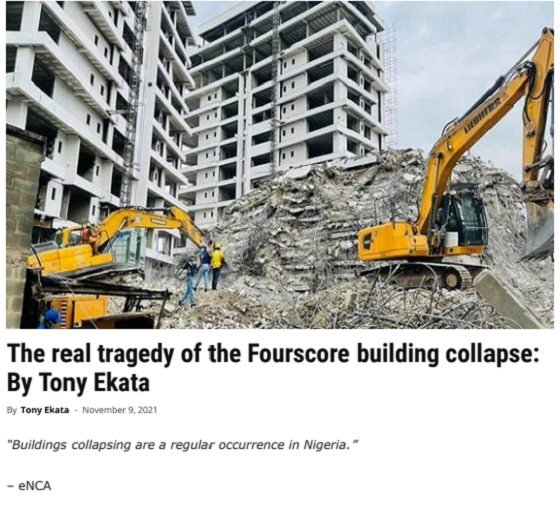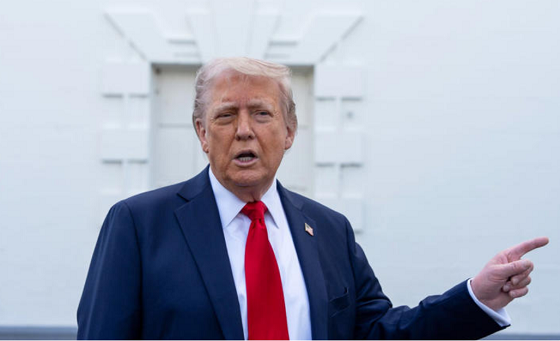Post Published on February 28, 2024 by Anthony Ekata
“Buildings collapsing are a regular occurrence in Nigeria.”
– eNCA
The above is the thrust of eNCA, South Africa’s foremost private television network’s coverage of the Fourscore building collapse in Lagos, Nigeria’s Johannesburg. It is no doubt a damning and rather hyperbolical synopsis of the tragic incident that changed the skyline of Gerard Road in the posh residential suburb of Ikoyi, Lagos, where the high and mighty huddle. However, it does have some validation in the popular TV station’s story and elsewhere.
In March 2016, The Nation, in a feature tagged ‘History of Collapsed Building (sic) in Nigeria, averred:
“Collapse of buildings is a universal problem that has eaten deeply into the fabrics of the construction industry, of which very little has been done to curb the menace. Nigeria like many other countries is witnessing building collapse at an alarming rate. In Abuja, the Federal Capital Territory, Lagos, Lagos State, Port Harcourt, Rivers State, Ibadan, Oyo State and Kaduna, Kaduna State to mention but a few, many cases of collapsed buildings have been noted.”
The most recent instances enumerated by the publication include:
- Uncompleted two-storey building, Isinkan, Akure, Ondo State (1998)
- Two-storey residential building, Funbi Fagun Street, Abeokuta, Ogun State (1998)
- On-going construction of a one-storey building, Benjamin Opara Street
- Port-Harcourt, River State (2006)
- Industrial Development Building (NIDB), Lagos (2006)
- A three-storey building at 15, Alli Street, Lagos, collapsed at about 00 pm and fell on a bungalow at number 13 of the same street, leading to its collapse in the same year.
- Chief among the terrifying incidents of building collapse in Nigeria is the July 2006 collapse in Surulere, Lagos State where three buildings caved in causing a pandemonium among residents and killing no fewer than 28 lives and left 50 others severely injured.
- Also in Lagos, the same month, about 37 people lost their lives in a four-storey building mishap at Ebute Metta
- A two-storey market plaza in Oshodi, Lagos (2010)
- Another tragic collapse occurred in September 2014, when over 100 worshipers were killed in a six-storey building under construction on the premises of the Synagogue Church of All Nations in Lagos State.
This list of disasters does not reflect federal character. But, of course, that is not something for which anyone would agitate.
Causes
According to eNCA, “Team Action International, which researches real estate investment in Nigeria, says there could be several factors leading to building collapses.” Those listed include:
Poor design and the use of poor building materials.
Foundation challenges – it is common practice for developers to convert bungalows into multi-storey buildings.
Incorrect reading of building plans as a result of the use of unskilled labour.
Non-compliance with correct construction methods and a lack of proper maintenance.
These factors are not too different from the ones proffered by experts in Nigeria. For instance, Mr David Majekodunmi, Chairman Lagos Chapter, Nigeria Institute of Architects, interviewed on Channels Television’s Sunrise Daily show, said it is a global practice to have a national building code. But in Nigeria, there is no definite building code to determine the building materials to be used, the quality of the materials, the labour and the standard.
“It’s such a shame,” he lamented. “I was at the site yesterday for almost four hours. The Nigerian Standards Organisation (NSO) was just coming to take samples. Samples for what when the head is off?” He wondered what standard the manufacturers of iron rods and cement blocks keep to.
Whatever else is the cause of this ‘regular occurrence’ of building collapse will hopefully be unveiled in the probe instituted by Lagos State Governor Babajide Sanwo-Olu, whose intervention in the tragic incident is commendable so far.
At the last count, over 40 bodies had been recovered from the debris, including that of Mr Femi Osibona, the founder of Fourscore Homes Limited, described as a “General Construction Contracting Company with Head Office located in Ikoyi, Lagos,” and owner of the collapsed 21-storey tower with its two cousins now standing forlornly AT 44BCD Gerard Road, Ikoyi.
Interventions
In October 2010, South African President Jacob Zuma joined world leaders in supporting the efforts and progress made by the rescue teams on a mission to save Chilean miners who had been trapped underground for 69 days.
“Having a strong mining culture like Chile, we can fully empathise with the fears and anxieties of those that have suffered this terrifying experience, the victims, their next-of- kin, the government and the people of Chile as a whole,” Zuma said.
He congratulated South African Mines Rescue Services and others who were able to offer their resources and expertise in the rescue effort.
In February 2016, three mineworkers were trapped inside Lily Mine in Louisville, outside Barberton. President Zuma not only sent reassuring messages to the families of the trapped miners, but he also dispatched three cabinet ministers to work alongside the Mpumalanga province to provide assistance and support for the affected families.
“The families are in deep pain and feel helpless in such an overwhelming situation,” Zuma said in a speech prepared for the 2nd annual Ubuntu Awards Gala dinner in Cape Town.
In May 2002, President Olusegun Obasanjo embarked on a two-legged official visit to Namibia and Botswana. As the Southern Africa Bureau Chief, Voice of Nigeria, this writer flew from Johannesburg to cover the event in Windhoek, returned to Johannesburg and drove some four and a half hours to Gaborone, Botswana for the second leg of the visit, only to be told on arrival that the event had been cancelled. Reason? There had been a tragic air crash in Kano, and President Obasanjo had to return to Nigeria to attend to the situation.
That was the EAS Airline disaster in which a twin-engine, British-built BAC 1-11-500 bound for Lagos with 71 passengers and eight crew members ploughed through about a dozen buildings in the Gwammaja quarters of Kano, killing 74 passengers and as many people on the ground. Scores of people were injured.
“We can confirm that 148 people died. They included passengers on the aircraft as well as people on the ground, but the figure could be more,” Patrick Bawa, spokesman for the Nigerian Red Cross told IRIN the next day.
Incumbent president, General Muhammadu Buhari, was in Glasgow, Scotland when the Fourscore tower collapsed in Lagos. He had left Aso Rock a day earlier to attend the COP26 Climate Change Summit billed for October 31 to November 12. Senior Special Assistant (Media & Publicity) Garba Shehu confirmed this in a Presidency statement:
“The President is scheduled to deliver his national statement at the High-Level segment for Heads of State and Government at the conference on Tuesday, November 2.”
Shehu added “In Glasgow, President Buhari will participate in some side-line events hosted by US President Joe Biden and French President Emmanuel Macron. President Buhari will thereafter travel to Paris, France on an official visit to reciprocate an earlier one to Nigeria by the French President, Emmanuel Macron, and also attend the Paris Peace Forum 2021, the fourth edition to be hosted by the French President.”
That Tuesday, President Buhari told the world via the COP26 Summit:
“I do not think anyone in Nigeria needs persuading of the need for urgent action on the environment. Desertification in the North, floods in the centre, pollution and erosion on the coast are enough evidence. For Nigeria, climate change is not about the perils of tomorrow but what is happening today.”
He pledged that Nigeria would reach net zero Emissions By 2060.
While the president was speaking in Glasgow, Scotland, the climate in Ikoyi, Lagos had changed. There was the emission of sorrow, tears and blood from victims and family members of the Fourscore Tower crash. Hurricanes and earthquakes are said to be part of the manifestations of climate change. Here is how media titan and former presidential aspirant Chief Dele Momodu described what transpired in his Ikoyi neighbourhood on that fateful Monday:
“I was getting ready to go out when a massive explosion, like a fiendish hurricane raised to the power of thousands, suddenly occurred. This evil explosion was so thunderous that it shook our six-storey building to its foundation and seemed to reverberate forever. To say that I was scared is to put it very mildly. I dialogued with my feet and started galloping away like an antelope. I kept screaming at my wife: “Bolaji, earthquake, earthquake, let’s move before the building collapses on all of us.”
Before or after President Buhari’s Glasgow address on Tuesday, The Presidency in Abuja issued a statement on the Lagos ‘earthquake’. The statement read in part, “President Muhammadu Buhari commiserates with families who have lost loved ones in the 22-storey building collapse in Lagos, while some are still trapped.
“President Buhari shares the sad moment with the people and Government of Lagos State, urging authorities to step up efforts in rescue operations, while emergency institutions, including hospitals, should provide all the necessary support to safeguard the lives of the rescued.
“The President prays for God’s intervention in the ongoing rescue operations.”
As of the time the presidential commiseration was released on Tuesday, about 10 persons had been confirmed dead. At the time of writing this, the death toll stood at over 40. Perhaps it would have been more if not for the president’s prayer.
Two days later, on Thursday, November 4, Saharareporters reported that the Commander-in-Chief had left Glasgow for London to see his doctors. The snoopy publication gave a detailed account of the trip to London:
“Though Shehu’s statement said the President would travel to Paris after the summit, investigation shows that President Buhari, after his speech on Tuesday at the COP26 Leaders’ Summit, left Glasgow for London for a medical check-up.
“SaharaReporters gathered that the presidential aircraft which conveyed Buhari, a Gulfstream Aerospace GV-SP (G550) with registration number 5N-FGW and serial number 5310 (Mode-S 0640F2) left the Glasgow International Airport at 10:14pm (9:14 UK time) and arrived at Stansted Airport, London at 11:11 pm (10:11pm UK time).”
The publication, which is fond of exercising its prerogative not to disclose its informants, attributed the information to unnamed ‘sources’. Anyway, that is another matter.
Back in Nigeria, Christians and Muslims were daggers-drawn in the media over the marching order issued by the Muslim Rights Concern (MURIC) to ‘the apex Yoruba social-cultural group, Afenifere, and other notable groups in the South West to ‘quickly react’ to a viral video clip depicting the late Fourscore boss, Femi Osibona, as a Muslims- hater for allegedly denying one Muslim applicant a job in his company at the site and on the day of the tower crash.
In a statement signed by its director, Professor Ishaq Akintola, MURIC described the applicant as a “victim” and Osibona as an “oppressor.” This was without any corroborative evidence of whether Osibona has Muslim friends, has ever helped or employed any Muslim in his company, or whether any Muslim was with him when the tower collapsed. Even more concerning to some observers was the fact that Osibona would never be able to give his side of the story. Sadly, members of the media were part of that imbroglio.
When the South African miners referenced earlier were trapped underground, the media covered all the efforts and interrogated the mining regulations deemed too tolerant of illegal mining. Experts were on TV critiquing extant laws and proffering amendments. But in Nigeria, many media professionals joined in interrogating morality and religious sanctity, with the tragic building collapse as a lens – betraying once again our collective addiction to that social opium.
This will not be the last controversy arising from this tragedy. As the celebrated essayist and public affairs analyst Dr Lasisi Olagunju pondered in this week’s edition of his Monday Lines series, entitled, ‘The Ikoyi high-rise rubble’, “So, what brought down that 21-floor building in our Lagos before its full moon? That is the question to ask and for which we must get the correct answer(s) if there won’t be another crash. Everyone knows that vultures forever hover over Lagos lands. For this one and its precious ruins, hawks and vultures appear fighting already. Read the news. Going forward, we will see the horrors clearly by the time ‘widow’ inheritors take over.”
Already, insurance companies in Nigeria have launched an investigation into the collapsed 21-storey building to ascertain if it is adequately covered and whether the victims’ families are entitled to any form of compensation. The umbrella body for licensed insurance companies in the country said on Sunday that none of its 41 members licensed to provide building insurance cover had shown up as the insurer of the property.
How can a project of that magnitude possibly have no insurance cover? Taxi drivers in Lagos are constantly harassed to provide evidence of their vehicle insurance. Apparently, ‘big men’ are not required to provide proof of insurance for projects where hundreds of citizens’ lives are at risk. What would be the fate of investors in that project and the remaining twin towers on the site, and what would be their state of mind as this investigation unfolds? What about the impact of these negative narratives on the perception of Nigerian developers and businessmen operating in other parts of the world?
All these constitute the real tragedy of the Fourscore Tower collapse.
From Random Thoughts: A Collection of Essays and Poems
By Tony Ekata
First published November 9, 2021 @
https://www.newsplus.com.ng/the-real-tragedy-of-the-fourscore-building-collapse-by-tony-ekata/ (Defunct)







